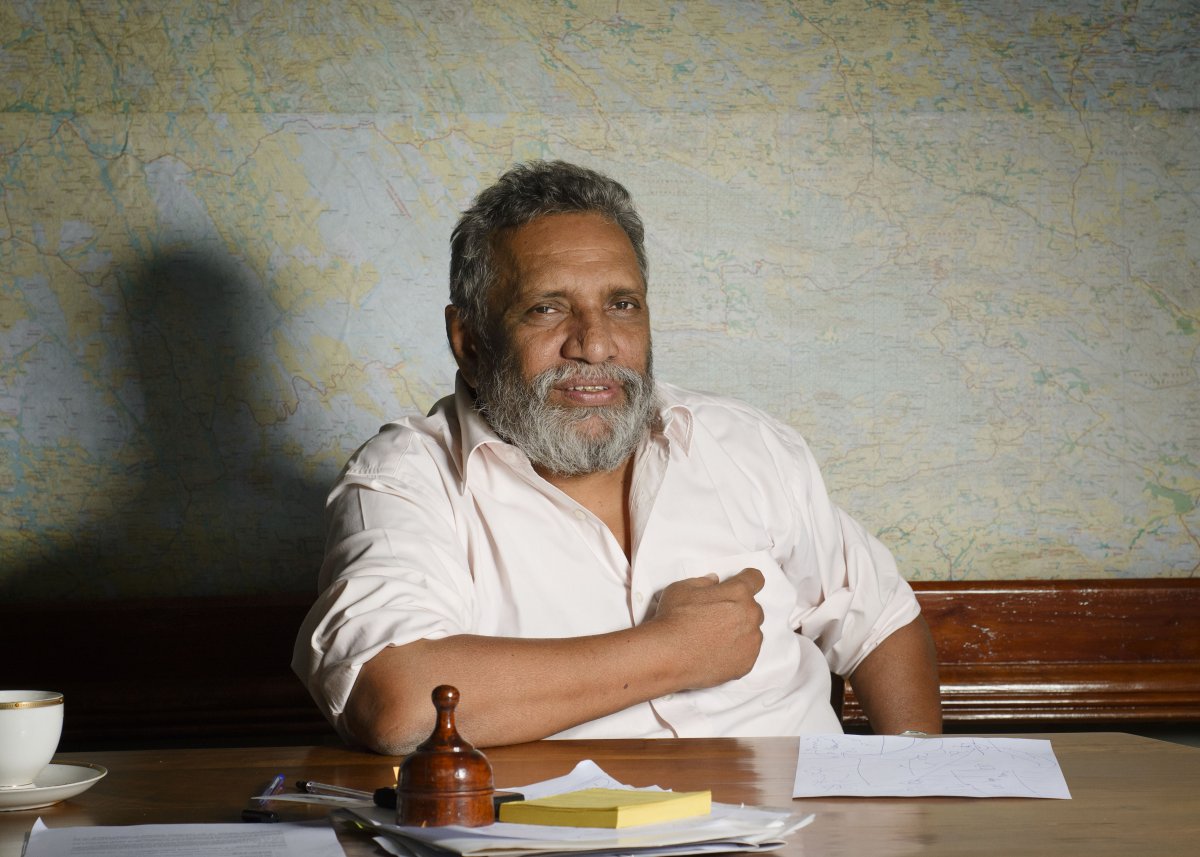
The morning of February 10 dawned like any other, but for a group of men and their acolytes, the day heralded the busiest 24 hours of their lives. Elections Commissioner Mahinda Deshapriya and his team of officers at the Election Secretariat readied themselves for a day of intense pressure, as Sri Lanka took to the polls to vote in the Local Government elections.
Nominations
For Deshapriya, preparations for the Local Government elections began much earlier, when, as per Section 25 of the Local Authorities Elections Ordinance, ‘nominations notices’ were published by Returning Officers. A ‘nominations notice’ contains all information relating to the period of nomination, number of candidates to be nominated, the number and/or symbols for each group, etc.
This is followed by the ‘acceptance of nominations’, which commences on the fourteenth day after the nomination notice is published and ends at noon on the twenty-first day after the nomination notice is published. The Returning Officers, in this instance, begin accepting nominations from various parties, as well as accepting objections to these nominations from various other parties.
In addition to these matters, the Returning Officers—who are Assistant Commissioners of Elections, Senior Assistant Commissioners of Elections, and Deputy Commissioners of Elections, each appointed to a local authority—‘check nominations’ to ensure they are in accordance to Section 28 of the Local Authorities Elections Ordinance.
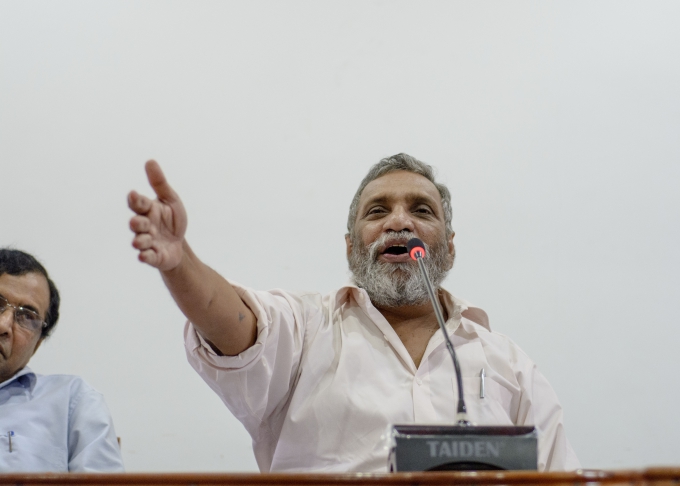
Elections Commissioner Mahinda Deshapriya addresses the press after the February 10 elections. Image courtesy Thiva Arunagirinathan/Roar Media
In the meanwhile, Elections Commissioner Mahinda Deshapriya said that the Elections Secretariat begins working closely with the Government Printers to print ballot papers, household notices (which inform voters about contesting candidates) and the ‘Elections Notice’—to be published in the Gazette—that contains information relating to each local authority.
Postal votes
Deshapriya and his team next begin the task of executing postal votes, in accordance with Local Authorities Election Act No. 24 of 1987. Postal voting facilities are provided for officers and employees of the public sector and security forces who are unable to cast their vote at polling station due to work they are entrusted with during that period.
There are several other matters that Deshapriya and his team must coordinate, which include the appointment of polling agents; two agents can be appointed by each recognized political party to be allowed to stay inside the polling station on the day of the election for observation, as well as coordinating with Police for security.
In terms of Article 104C of the 17th Amendment to the Constitution, the Police Department is duty bound to follow the instructions of the Commissioner of Elections to conduct a free and fair election. To this end, Deshapriya said, he works closely with DIG of Elections, the Senior DIG of Elections, the DG Elections, and the Civil Defense Department and their team of police officers.
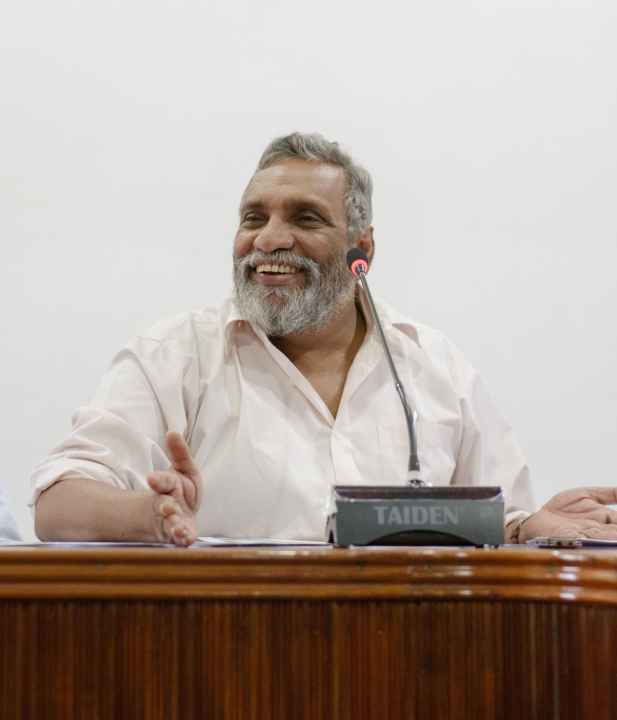
Elections Commissioner Mahinda Deshapriya: good-natured banter and an easy manner hide a sharp mind. Image courtesy Thiva Arunagirinathan/Roar Media
There are other logistical matters Deshapriya must oversee; these include selecting polling centres, staffing polling centres, organising food and transport for polling staff and counting staff, as well providing them with transport and lodgings. The government of Sri Lanka typically uses public servants at polling and counting centres.
Two days before the election, ballot boxes are sent to the issue point, Deshapriya said. In Colombo, these are the D.S Senanayake College and Royal College, while in other districts, premises of equal significance are used. It is from this ‘issue point’ that ballot boxes and papers are issued to polling stations that are typically housed in public schools or temple premises.
Election day
On the day of the election, Deshapriya and his team arrive at the Elections Secretariat early. Polling begins at 7 am and ends at 4 pm, and much of Deshapriya’s time is spent putting out flames. ‘I’ll get a call from one place, not enough ballot papers, I’ll get a call from the next place, someone hasn’t been allowed to vote and is appealing to me, the calls are endless but we deal with all of them,” he explained.
Deshapriya has, in fact, set up a Complaints Centre at the Elections Secretariat to handle these issues in particular. An overwhelming amount of complaints are made that employees are not being allowed to leave work to vote, Deshapriya said. In these cases, the team working with Deshapriya sets to work, calling the HR management, urging them to grant their employees leave to vote.
“We try to push the point that it is everyone’s right to vote,’, Deshapriya said, explaining that although an employee was liable, under Section 84A of the Local Authorities Elections Ordinance to grant leave for votes, written complaint was needed to take action against the difficult employer—a matter not easily rectified given time constraints and the employees’ fear of losing jobs. “If these people press the point they will be asked to go home, so we appeal to the HR management to give them the freedom to exercise their rights.”
Counting
At 4 pm, once the polling stations close, the ballot boxes are transported to the District Headquarters, where counting staff await their task. The ballot boxes are closely guarded by police officers, and polling agents (or party representatives) are often allowed to place a sticker across the ballot box before the box is transported to ensure the seal is not broken until the boxes reach the District Headquarters.
Once the ballot papers are counted, Senior Presiding Officers at the District Headquarters tabulate the results that are then faxed to the Elections Secretariat. The same data must be entered into software used by the Elections Secretariat; the two sets of figures are tallied with each other for any errors, after which, if necessary, the Elections Commissioner will call for a recount.
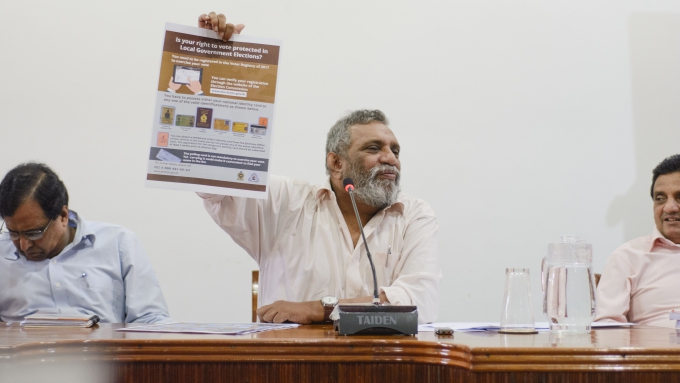
Addressing the press, Deshapriya makes a point. Image courtesy Thiva Arunagirinathan/Roar Media
Election results are typically announced ward-wise, between 8 pm and 12 midnight by the Returning Officers. However, there can be delays, Deshapriya said, explaining that in some cases there is a failure with software, in other cases results have to be recounted in certain wards.
Results
The results are finally announced to the media, by which means the general public learns which candidates won in their local authority. But work doesn’t end there for Deshapriya and his team at the Elections Secretariat. In the aftermath of the election, parties dissatisfied with the results of an electorate often demand a recount.
Post-election elation and violence are also not to be ruled out. Deshapriya said police presence remains at the Elections Secretariat till well after the election is concluded. Furthermore, petitions can be filed at the Court of Appeal and the Provincial High Court by parties not satisfied with the results of the election, leading to protracted issues.
However, Deshapriya, a veteran, takes it all in his stride. A jovial man, his easy manner, and good-natured banter hide a sharp mind and the ability to withstand enormous pressures. Able to take control of any trying situation, Deshapriya steers the most important exercise of franchise with seeming ease. “We are very happy this election was free, fair, credible, and transparent,” Deshapriya said of the February 10 LG polls.
Cover: Elections Commissioner Mahinda Deshapriya. Image courtesy Thiva Arunagirinathan/Roar Media

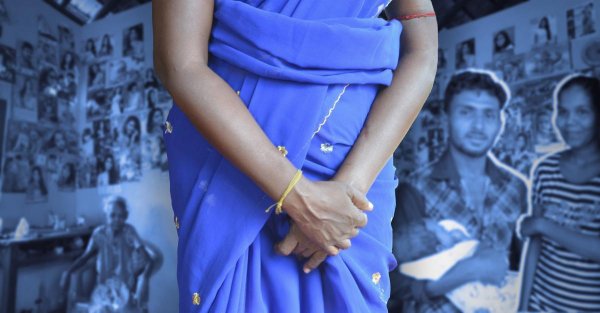

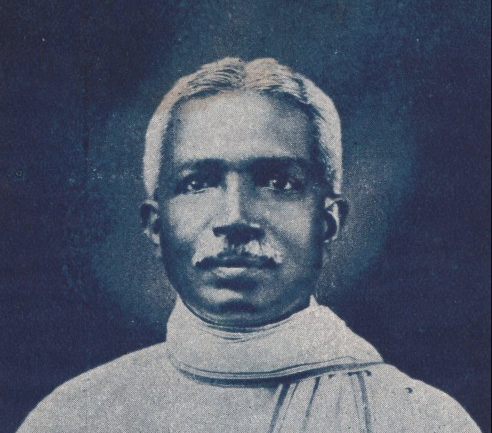

.jpg?w=600)


